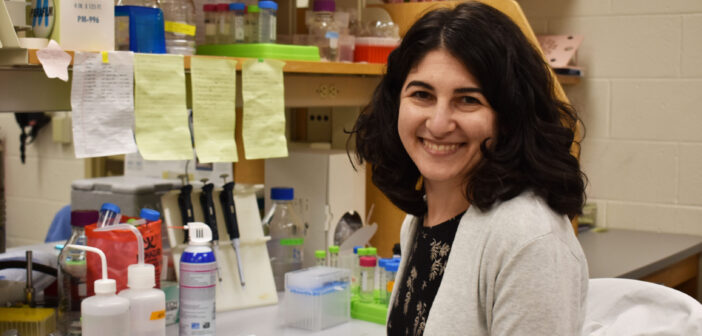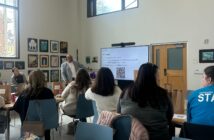Chemistry professor Oriana Fisher said humanity has used copper as an antimicrobial agent — something that kills or stops the growth of microorganisms — since ancient times. However, little is currently known about the process of copper entering bacteria and what it does once it gets there.
This unknown is exactly what Fisher hopes to uncover with the $1.9 million in funding she received in September from the Maximizing Investigators’ Research Award, given by the National Institutes of General Medical Sciences.
According to the institute’s website, the goal of the grant is to increase the efficiency of the National Institute of General Medical Sciences by “providing investigators with greater stability and flexibility, thereby enhancing scientific productivity and the chances for important breakthroughs.”
After applying and waiting for 10 months, Fisher said she has two main goals in her research funded by this grant. The first is learning about how bacteria take copper ions into the cell and the second is understanding how different enzymes are specific for different binding partners, leading to different cellular outcomes.
Fisher said researching bacteria and its processes can help scientists learn about how the biology of the model organism works, leading to a better understanding of organisms that are capable of carrying disease.
She said a current challenge with antibiotics is they kill every bacterium instead of specifically targeting those that are harmful. Long term, she hopes her research will help develop new ways of combating bacterial infections.
“If we can understand more about what the proteins that are involved in these pathways and processes look like, that will give us more clues about how they work,” Fisher said. “I think that if we understand more about some of the specific biochemistry and individual bacteria, that could give us some tools to develop new types of drugs that would be much more directed at a particular pathogen.”
Before coming to Lehigh, Fisher worked in a lab at Northwestern University studying copper usage and bacteria. She said this is what sparked her interest in bacteria.
Fisher said there are tens of thousands of different bacterial species.
She said unlike most of human biology that has been studied thoroughly, there is still a lot not understood about bacteria.
This grant, Fisher said, will help pay for the salaries of individuals in her lab and support their work.
Fisher said her research team is composed of undergraduate students, graduate students, postdoctorate researchers and faculty collaborators from Lehigh, and other institutions.
Yuri Silva, a postdoctoral researcher in Fisher’s lab, said he started research in biochemistry while working toward his Ph.D. and was always interested in how bacteria worked. This led him to study protein structure and function.
He said he and Fisher’s interests aligned after he finished his doctorate and heard she was looking for a postdoctoral researcher.
“Working with (Fisher) is amazing,” Silva said. “She is always eager to help us in the lab, teach us new things, and give advice in science, and she’s always open for discussions.”
Silva said the grant will also help their research team acquire equipment, quicken research processes and allow travel to other facilities with techniques and specialized personnel to help with techniques they are not experts in.
Anand Jagota, the vice provost of research at Lehigh, said the most amount of funding for research comes from federal government agencies, the state and some foundations.
He said to get funding for research — especially in the science, technology and engineering fields — faculty members, by themselves or with a group, write proposals and apply for funding.
In the case of applying for funding from agencies, Jagota said there is a competitive funding approval process where the proposals get evaluated by experts, and the funding agency decides how it can support the research.
He said it’s not unheard of to receive an award of this amount, but it’s not common either.
“It’s a great honor,” Jagota said. “As a young assistant professor, it’s a great opportunity for her to win such a prestigious award.”
Fisher said receiving this award felt like a huge accomplishment.
“It’s really exciting to finally have the resources and to be able to pursue a lot of these studies,” Fisher said. “It’s very validating to feel the ideas that I, and that the students in my lab, have helped us develop our things that the scientific community is very excited about.”






Comment policy
Comments posted to The Brown and White website are reviewed by a moderator before being approved. Incendiary speech or harassing language, including comments targeted at individuals, may be deemed unacceptable and not published. Spam and other soliciting will also be declined.
The Brown and White also reserves the right to not publish entirely anonymous comments.
1 Comment
I hope Professor Fisher kills it, but only selectively